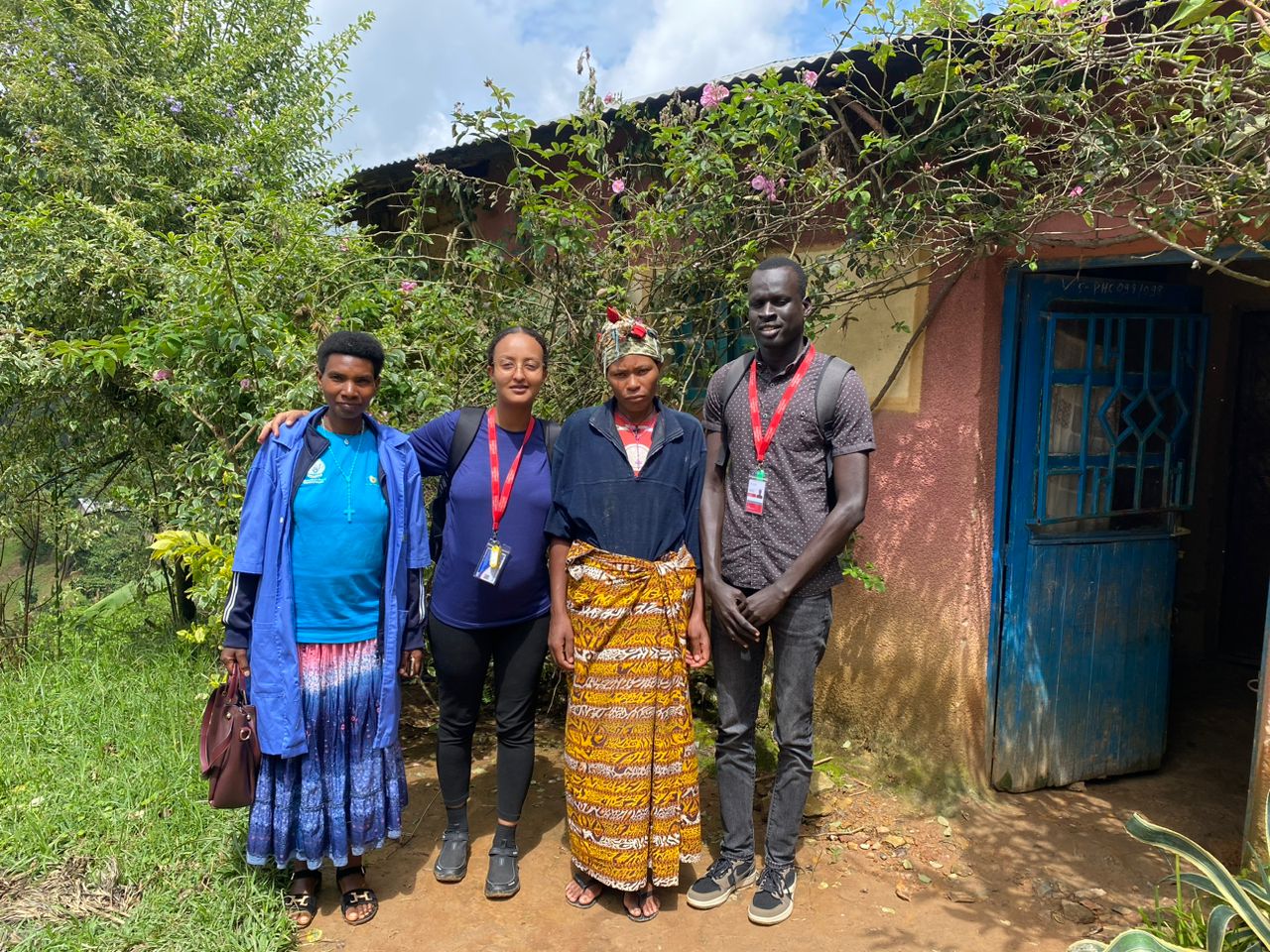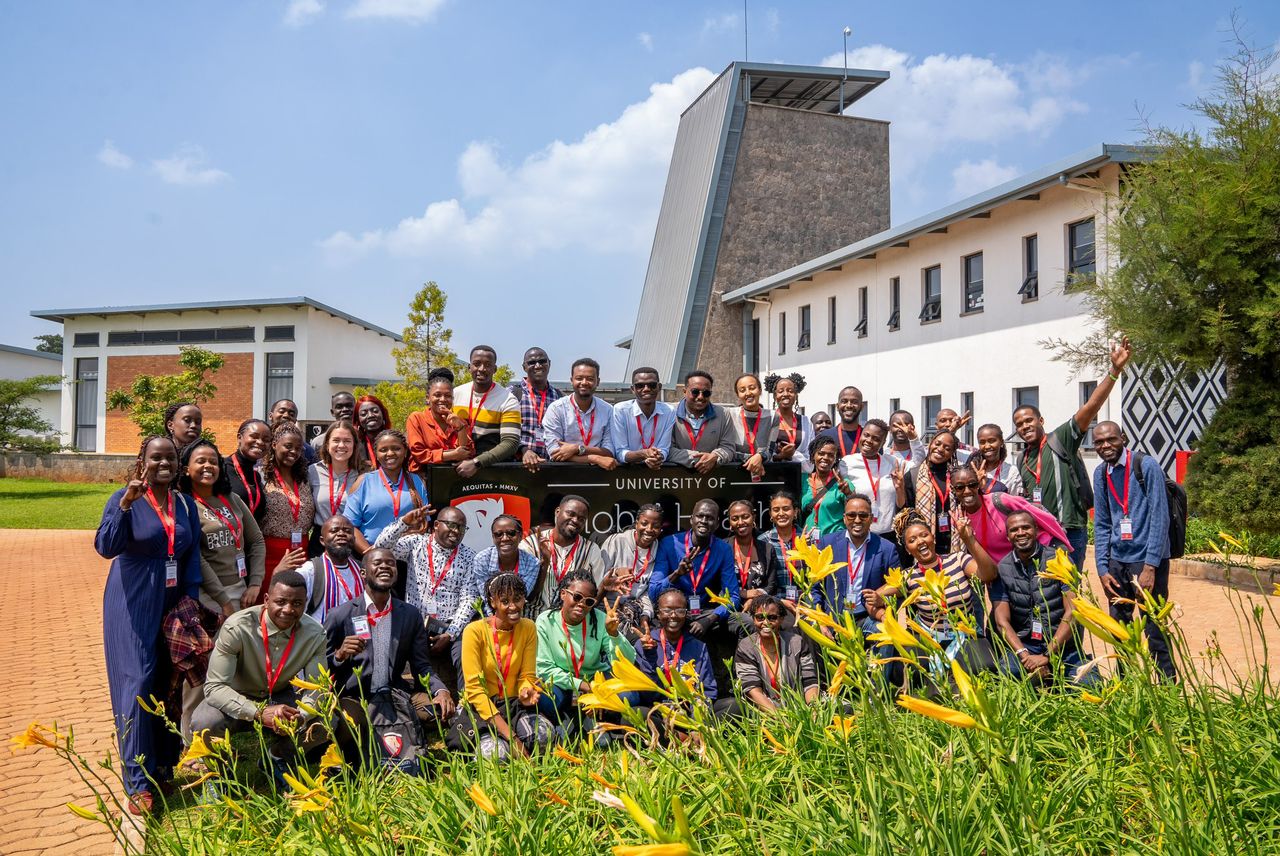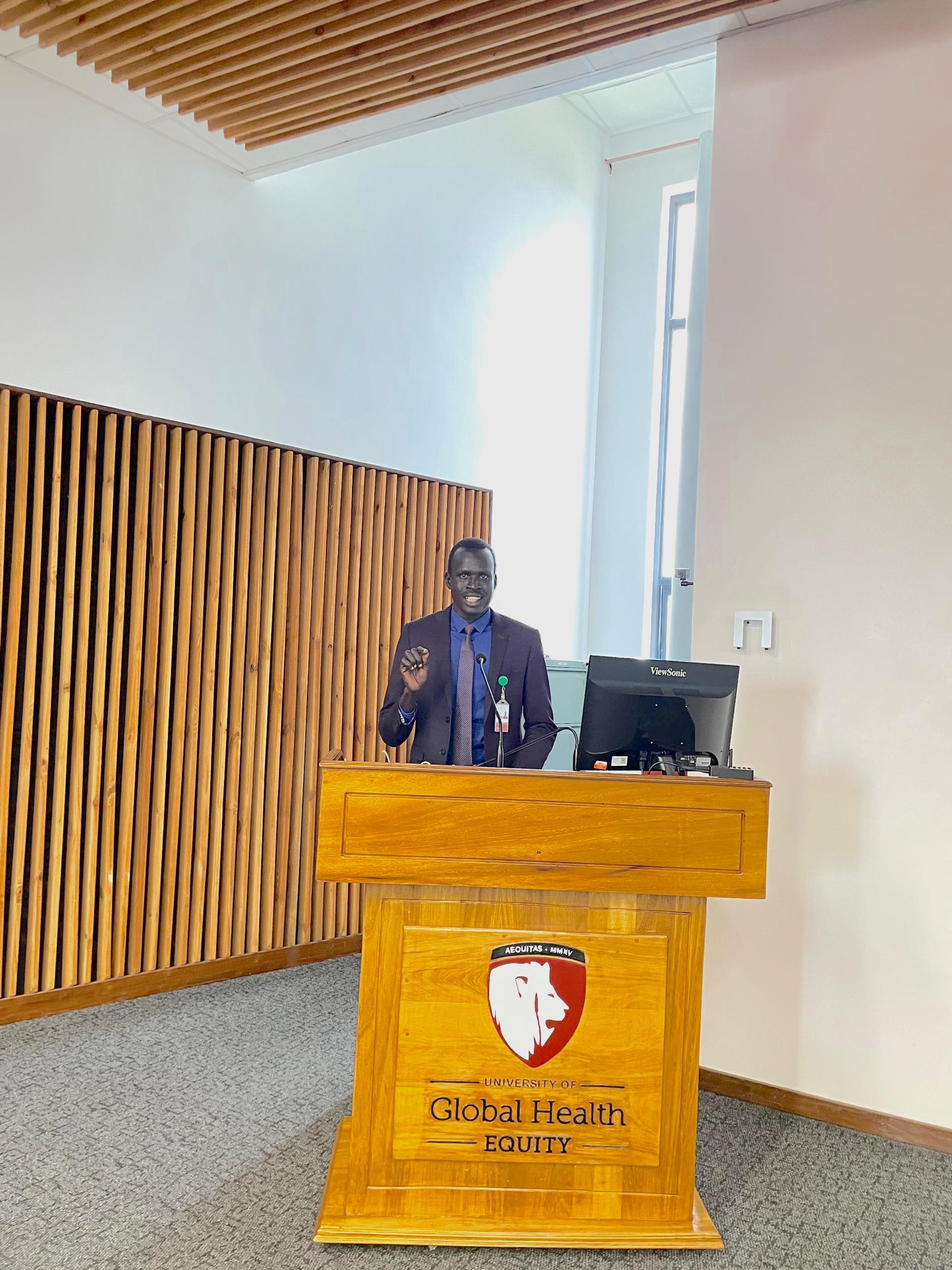Pioneering Surgical Care: UGHE Student Majok Deng Akok Shares His Vision
July 24, 2024 2024-07-24 20:23Pioneering Surgical Care: UGHE Student Majok Deng Akok Shares His Vision
Majok Akok, a passionate health professional from South Sudan is a part of the 2024 graduating cohort of 49 students. He has been pursuing a Master of Science in Global Health Delivery (MGHD) with a focus on Global Surgery at UGHE. With a background in Public Health and Clinical Medicine from Assosa University in Ethiopia and experience in public health emergency operations, he is driven to strengthen South Sudan’s healthcare system. Majok’s experience at Butaro campus has helped him to understand that global surgery matters because without it, almost all of the Sustainable Development Goals, specifically the health-related ones, would not be achieved.
Learn more about his experience in the MGHD program from the following Q&A session.
Q: Who is Majok Deng Akok?
A: I’m Majok Deng Akok, a student at UGHE focusing on Global Surgery. I’m passionate about transforming healthcare in South Sudan, and I summarize my life purpose as “HEL,” representing Healthcare, Education, and Leadership. I want to use my education to enhance leadership in healthcare in my country.
I have a bachelor’s degree in Public Health and Clinical Medicine from Assosa University in Ethiopia and experience with the South Sudan Ministry of Health, particularly in public health emergency operations. My work during the 2023 refugee crisis exposed me to the weaknesses in our healthcare system, especially in surgical care. This experience drives my ambition to build a resilient health system in South Sudan, combining clinical practice with public health policy to address both individual and community health needs.
In global surgery, I’m part of the advocacy committee at the Association of Academic Global Surgery (AAGS), working to improve representation of low- and middle-income countries in the global surgery community. Advocacy ensures all voices are heard and respected, and I hope to contribute to the understanding of global surgery’s role in the global south.
Q: What motivated you to apply for the MGHD program, particularly focusing on Global Surgery?
A: Since my childhood, I knew that I wanted to be a doctor. This was inspired by the daily encounters I met at my community level. There were no trained doctors, and the only person whom we called a doctor learned his skills on the job and had not even completed his primary studies. That is where I grew up. This dream remained in my mind through my primary and secondary school studies. I hoped to become a neurosurgeon.
In 2017, when I began my undergraduate studies in Ethiopia, I thought I would study medicine and surgery. But some conditions beyond my control made me study Clinical Medicine and Public Health, a four-year program. This left me with few chances of ever getting into a surgical residency program without having to go back to medical school. I thought of remaining a clinician but later transitioning to public health.
When I learned about the MGHD new Global Surgery option, I felt like my dream to be in surgical care had come true. I now understand that I can build my country’s surgical system “beyond the operating room (OR).” I might not be holding the scalpel, as I had always wanted to do, but I can now drive policies and design strategic plans to improve what goes on in the OR.
My major reason for joining the MGHD Global Surgery option has been the same—to do research that will support the development of the national surgical policy and plan for the Republic of South Sudan. The first step of generating the baseline data is the focus of my practicum project.

Q: Among the MGHD modules, which ones stood out to you, and what key lessons have you gained from them?
A: As I mentioned earlier, my goal of taking this master’s program was to gain skills and expertise to support the development of the national surgical policy and strategic plan for my country. Throughout my MGHD program journey, all the modules have made their contributions to developing skills to design this plan. However, the modules on Global Surgery Policy and Advocacy, especially the component that focused on the National Surgical, Obstetric and Anesthesia Plan (NSOAP), directed by Professor Emmanuel Makasa, stood out to me. This module gave me the tools to develop a similar plan for my country. It was taught by a prominent figure in Global Surgery, a person who did a lot in the negotiations of the World Health Assembly (WHA) Resolution 68.15, which brought a spotlight on emergency and essential surgical services as inherent components of Universal Health Coverage.
With Professor Makasa, I have learned how to effectively use diplomacy to get champions in the government, especially the ministry of health, to advance the case for surgical care. I was captivated by how he influenced his Zambian government to take the lead and become the first African country to implement the recommendation to develop an NSOAP. Through this module, I also learned that money is always there. And because money follows ideas, we just need to generate ideas and pitch them to where the money is.
With these insights, I believe that my approach and plan to achieve my vision for surgical care in South Sudan is clear and on track.
Q: In your perspective, what does global surgery mean, and why do you believe it matters?
A: For the 5 billion people lacking access to surgical and anesthesia care, being intentional about our actions is more critical than ever before. I believe that this number has increased during the COVID-19 pandemic, especially in low- and middle-income countries where more than 90% of the people who do not have means to access essential surgical care live. This is where my country, South Sudan, lies.
For me, global surgery means a baby born with clubfoot or cleft lip or palate gets surgery or surgical management to correct the congenital anomaly. I have had childhood friends who went through life with the difficulties imposed on them because of same conditions. I genuinely want them and any other child to live a normal life. Global surgery means an expectant mother who encountered obstructed labor or bleeding has the life-saving care to keep her and her newborn alive.
For all these things to happen, the global surgery community needs to think of access in all the four dimensions brought forward by the Lancet Commission on Global Surgery report, namely, time, capacity, safety, and affordability. The vision is clear, and that is everyone, yes everyone, regardless of who they are or are not, should have access to timely, safe, and affordable surgical and anesthesia care when they need it. It is not when we are ready; the goal should be to be always ready to deliver surgical services. To me, that is what global surgery means, and we need to advocate and work hard to achieve this ideal.
Again, global surgery matters because without it, almost all of the Sustainable Development Goals, specifically the health-related ones, would not be achieved. The road to achieving Universal Health Coverage passes through global surgery. Most importantly, why should we leave behind 5 billion people without access to surgical and anesthesia care? That is exactly why you should be involved in global surgery; it is about saving your own life!
Q: How has being part of the diverse 2024 cohort influenced your learning experience both inside and outside the classroom?
A: I have always seen UGHE as a networking hub. In fact, that influenced my decision to be part of this vibrant community. Being part of the 49 students from 14 countries across the globe meant that I have an ally from anywhere around the world. Even within my Global Surgery option, the 9 of us come from 5 different countries: Kenya, Ethiopia, Sierra Leone, Rwanda, and South Sudan. You can only imagine how the discussion goes on in the class. We all think and communicate differently. For me, it taught me to be always ready to tolerate and learn from different opinions and viewpoints.
Before I came to our UGHE Butaro campus, we took an online global surgery course taught by faculty from UGHE and Duke University. Through that course, we worked with students beyond UGHE, none of whom we have met or will ever meet in person. Throughout these experiences, I learned that conscious networking should always be part of what we do wherever we find ourselves.
Though our busy schedules did not allow us to explore a lot of things about our diversity, we all appreciate the uniqueness each person brings to the UGHE community. This was self-evident during the celebration of the UGHE Cultural Day. As one of the judges during that day, I was impressed and inspired by our diversity. Just like the diverse MGHD class, the global health community is more diverse than my class, and my interactions during this program have prepared me for this wider community.

Q: Would you tell us briefly about your practicum project?
A: I knew that I wanted to do something about improving surgical care in South Sudan. However, I did not have the technical skills to do so. Joining the UGHE MGHD Global Surgery option completed the equation. During the admission interviews, I was asked about my plans during and beyond the program. I talked about doing my practicum project at the tertiary hospitals in the country to capture data on the six Lancet Indicators of surgical care in the country. This was to understand where South Sudan is in terms of access to surgical services.
After joining the program, my practicum project morphed into “Analyzing access to surgical services in Central Equatoria State, South Sudan: A baseline cross-sectional assessment to inform national surgical policy and planning.” Central Equatoria State is one of the ten states and three administrative areas in South Sudan; it hosts the national capital, Juba.
I collected and analyzed data on access to surgical services at six key public health facilities in the state. Using the Harvard Program on Global Surgery and Social Change (PGSSC) Surgical Assessment Tool (SAT), I gathered baseline data on surgical service delivery, workforce, infrastructure, information management and health financing. With this baseline assessment, I hope to kick-start the discussion on the development of national surgical policy and planning.
Q: Reflecting on your journey through the program, what emotions does your upcoming graduation evoke? Can you share some of the challenges you overcame and the highlights that made it worthwhile?
A: I do not have the words to describe my excitement about my upcoming graduation. From missing my first admissions interviews due to my rural posting while responding to the health emergencies during Sudan’s War Crisis, difficulties encountered in paying my enrolment fee and eventually to getting a full scholarship, it is a huge relief!
This academic milestone is not about me, but honestly about the over 12 million South Sudanese whose lives will be improved because of my efforts to transform surgical healthcare delivery in South Sudan. For me, this is just a step in my journey to changing the fragile healthcare system in South Sudan.

Q: You are given a platform to tell the world about health equity. As a graduand from UGHE-MGHD-GS, what is that message?
A: For me, health equity can be best illustrated when a poor rural farmer with no financial capacity to pay for an expensive surgery in an urban hospital still gets the surgery. I used surgery as an example because it has been a “Neglected stepchild of global health.” While a lot has changed in the direction of improving equity in surgical care, the resources and investments have not been on par with the widening need for surgical services. This is especially true for low—and middle-income countries like South Sudan.
Equity in surgical care delivery has been a critical challenge for resource-poor settings. However, access to surgical care is a basic need, and this should be everyone’s business. Until everyone has access to surgical care whenever needed without having to worry about the cost, we still have a long way to go to close the inequity gap in global health. In short, equity in surgical care is a prerequisite to achieving Universal Health Coverage and several of the United Nations Sustainable Development Goals (SDGs).
Q: In what ways has your focus on Global Surgery equipped you to tackle health inequities in communities? Can you provide specific examples of the skills you’ve gained and how you plan to apply them?
A: I deliberately chose the global surgery track because of my limited skills and expertise in the field. Before joining the MGHD in Global Surgery program, I was only sure of the need to improve surgical care in South Sudan, primarily by conducting a baseline study to understand access to surgical services in the country. But I did not know how to go about it.
I learned how to conduct research, design advocacy campaigns, and write health policy articles during the program. Regarding research skills, the testimony is the master’s thesis I defended on July 23, 2024. This work points to the journey I undertook last year to gain experience in global health. More importantly, I have learned how to dig deeper into the data to identify health inequities and how to address them. For example, I learned that 50% of the facilities I studied do not offer surgical services. This gap became apparent because of the research skills I learned from the program.
As I graduate from this program, I am confident that my skills in monitoring and evaluation, policy analysis and development, health systems thinking, and equitable partnerships, among others, have been sharpened to a world-class level. In a nutshell, I entered UGHE as a global health student, but now I am leaving it as a steward of global health.







